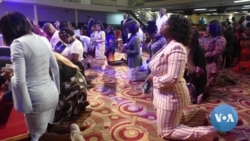The largest concentration of black African churches outside of Africa can be found in south London. Each week, about 20,000 people attend one of the mostly Pentecostal churches.
There is prayer, but also lots of singing and dancing at the majority black African churches. The House of Praise is one of those churches where hundreds of people gather each Sunday.
Precious Ogbomna is of Nigerian heritage and has been attending for more than two years. She likes that there is a connection to the African continent.
“It gives you a slice of home,” she said. “Your parents raise you in a certain culture, and sometimes you can feel a bit alienated outside or somewhere else. It just feels like home really.”
Diaspora community
Many English churches seem to have a declining congregation; but, the African churches in south London are growing in popularity, thanks to the large diaspora community residing in this part of London.
Public theology lecturer David Muir explains what makes the diaspora churches stand out:
“First and foremost, the diversity of these churches, some churches got 20 people, some maybe six, but of course other churches with 600 plus. So the kind of diversity of those churches is one thing,” he said. “The second thing is that most of these churches are actually keen to get involved in social action; they tend to do that in terms of things like education and welfare. But, what I found very interesting in the church is the way in which they take the mission seriously. A lot of these folks here feel that God has sent them here to evangelize the local population.”
Active in community
The churches are quite active in the community. Besides Bible study, the House of Praise provides language classes. They also organize other activities such as soup kitchens to feed the homeless.
At the House of Praise, like many other churches, more than 80 percent of the worshippers have African heritage. Assistant Pastor Gbenga Samuel sees a role for the church to better integrate the diaspora and indigenous community.
“We are kind of the seed that was sown by those who brought the gospel earlier on,” he said. “And we are kind of the fruits of those seeds; we bring it back and are trying to bring Christ back into the center of everything that is done.”
Many of the majority-black churches do not own traditional church buildings. The House of Praise bought a former bingo hall to host its congregation. Others use schools or community centers. Perhaps the lack of space in London might, in the future, be the one thing that will integrate local and diaspora churches.





